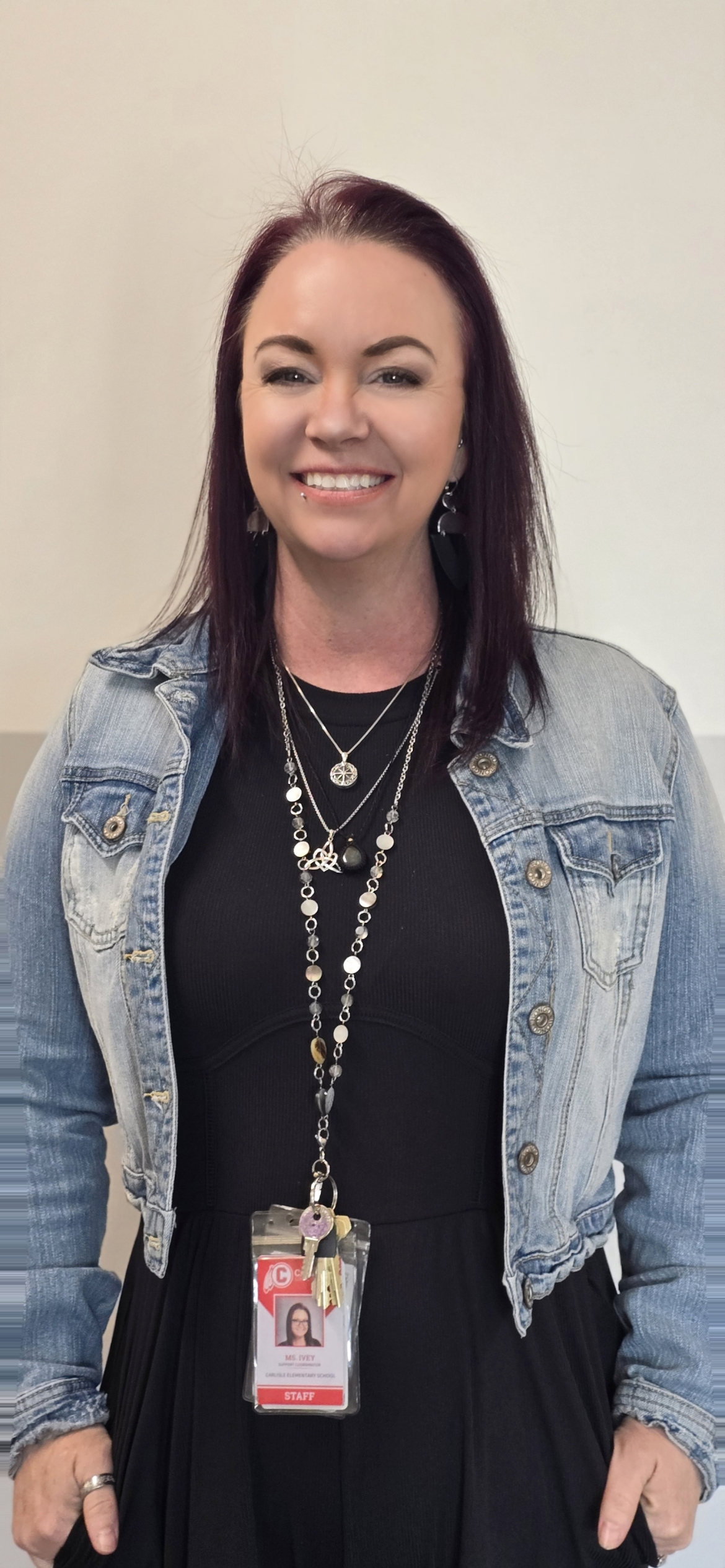
Erica Ivey, MSW,LISW
Mental Health Consultant
My name is Ms. Erica Ivey, and I am the Mental Health Consultant for Carlisle Elementary School. I am so excited to be part of the Carlisle school family for the 4th year. I have an undeniable passion for empowering youth and always knew my dream job was to help others. I received my bachelor’s degree in social work from Wright State University, and I received my master’s degree in social work at Miami and Wright State University. I am an individually licensed therapist for the state of Ohio. I have a variety of experiences as a social worker and therapist. Outside of my role at Carlisle, I have a private practice, where I do individualized therapy for adults, specializing in anxiety, depression, trauma, and ADHD. My most recent experience prior to this role, has been working as a director of a domestic violence and human trafficking shelter. Additionally, I worked as a Victim Advocate in various Butler County courts. In my spare time, I love to spend time with my fiancé, 4 adult children and 4 dogs: often traveling and enjoying nature. I am also an artist, photographer and an author.
What I love most about working with students is empowering them to utilize their strengths to develop effective coping skills to manage their emotions, as well as help them to build healthy and meaningful relationships. This is a great time for students to discover their interests and learn skills that can last a lifetime. I am excited to meet with students individually and in small groups. It is important to me that I work closely as a collaborating team with parents/guardians, teachers, administration, and staff to ensure your student is receiving all the support they need to guide them through their elementary school years. Please do not hesitate to contact me with any questions or concerns. I look forward to working with you all and getting to know your students more throughout the school year!
Contact Information:
erica.ivey@carlisleindians.org
937-746-8969 ext. 187
Group Counseling
Continuing in the 2022-2023 academic year the school counselor will be collaborating and working with the mental health consultant provided by Warren County ESC to address student mental health needs using an evidence-based curriculum in a small group setting. These groups will last 6-8 weeks and will cover the following topics:
Mindfulness 1 Group
Mindful awareness practices are “exercises that promote a state of heightened and receptive attention to moment-by-moment experiences” (MARC). This simply means focusing on being fully present in the given moment while working to identify and be aware of our own feelings, sensations, and emotions.
Through these practices, children learn how to reflect on what is happening within the context of:
- Their own bodies (self-awareness, coping skill development)
- In the environment that surrounds them (social awareness, relationship skills, time management and organization)
- Inform how they react or interact with others or alone in various situations (self-management, responsible decision making)
Emerging research shows that the practice of mindfulness can help individuals manage and prevent prolonged stress, respond to anxiety, and respond to an array of emotions to make constructive choices about personal behavior and evaluate the benefits and consequences of various actions for personal, social, and collective well-being. Mindfulness and social-emotional learning go hand in hand. By starting from within and leveraging our own unique skills, strengths, and experiences, we can begin to build upon those social-emotional learning skills and craft lifelong, healthy habits.
Mindfulness 2 Group
Mindfulness 2 group therapy is a powerful tool. It helps people be more aware of their thoughts, feelings and actions. This way, they can spot what stops them from making progress. People learn and grow together in this type of therapy. They share experiences and give each other support in a safe setting. In these sessions, the focus is on being present in the moment rather than thinking about past or future events. These shared experiences bring about connection and understanding among members helping each person feel less alone on their journey towards awareness improvement through mindfulness skills learned in every session. Experts have found that it also reduces mind wandering which can cause depression and anxiety.
When someone is described as being mindful, it typically means they pay attention to what is happening to the mind, body, and surroundings, and they remain present while both curious and compassionate.
This mindfulness group brings all of our senses together to learn effective ways to communicate, practice respect, organization and coping skills to lead to successful control of oneself.
Anxiety & Depression (A&D) Group
Many children have fears and worries and may feel sad and hopeless from time to time. Strong fears may appear at different times during development. Although fears and worries are typical in children, persistent or extreme forms of fear and sadness could be due to anxiety or depression. Anxiety and Depression is a common diagnosis in many individuals. Some symptoms of anxiety are:
- Being very afraid when away from parents (separation anxiety)
- Having extreme fear about a specific thing or situation, such as dogs, insects, or going to the doctor (phobias)
- Being very afraid of school and other places where there are people (social anxiety)
- Being very worried about the future and about bad things happening (general anxiety)
- Having repeated episodes of sudden, unexpected, intense fear that come with symptoms like heart pounding, having trouble breathing, or feeling dizzy, shaky, or sweaty (panic disorder)
Some symptoms of depression are:
- Feeling sad, hopeless, or irritable a lot of the time
- Not wanting to do or enjoy doing fun things
- Showing changes in eating patterns – eating a lot more or a lot less than usual
- Showing changes in sleep patterns – sleeping a lot more or a lot less than normal
- Showing changes in energy – being tired and sluggish or tense and restless a lot of the time
- Having a hard time paying attention
- Feeling worthless, useless, or guilty
- Showing self-injury and self-destructive behavior
These symptoms can often be disruptive to a child’s academic and social experience. When children struggle with anxiety, depression, and other mental health issues, they often feel isolated or alone. They feel like others don’t understand them. A & D group gives a chance to help children work through their obstacles with other kids as they occur. In collaboration, children are able to develop coping skills and assist in building self-confidence, assertiveness and empower kids to sidestep negative peer and societal pressures.
Grief Group
Children experience the same range of emotions as adults, but because they are still developing cognitively and emotionally, they are not able to grieve in the same way. Children’s coping skills are limited. Grief can be a very confusing emotion for children, and without the proper guidance, they may not be able to grieve properly.
Due to their developmental limitations, children need education about grief as well as assistance in identifying their complex feelings. For them, grief issues will resurface throughout their growth. As they develop mentally and emotionally, they will need further education and support to become happy and healthy adults.
Grief and loss come in many forms. A child could be grieving the loss of a loved one due to death, divorce/separation, deployment, deportation, incarceration, or trauma. The purpose of this group is to provide a safe and supportive environment for children to let them know that they are not alone. Children will have the opportunity to honor and identify their feelings and develop healthy coping skills to process their grief or loss.
Empowerment/ Self-Esteem Group Overview
The goal of this support group is to empower students and help build their self-esteem. Students will be able to further understand who they are, build upon their strengths, and build new friendships. I also hope by empowering participants and building their self-esteem, students will in return learn how to help build self-esteem and mentor their peers on positive self-actualization.
Anger Management Group
This group will focus on expressing and managing anger in an effective and healthy way. It is an opportunity for students to recognize physical and emotional responses to anger, explore thoughts/feelings and situations/triggers that lead to anger. This group will assist in developing effective coping skills to manage anger in a positive manner to improve social problem solving skills and strengthen their relationships.
Healthy Relationships Group
Healthy Relationships group is a multisession, small group skill building program designed for 5th and 6th grade students. In healthy relationships, we must maintain the freedom to be ourselves. It is important to maintain an individual identity, regardless of the type of relationship being pursued. The goal of this support group is to help students build skills in developing and maintaining healthy relationships with their peers, family, and self, now and in the future. The students will learn how to apply their knowledge by learning in group role play and psychoeducation. Students will be able to further their understanding of what makes them a good friend, what qualities make good friends, and how to end a friendship respectfully. Healthy relationships result in mental-emotional, social, and physical benefits.


